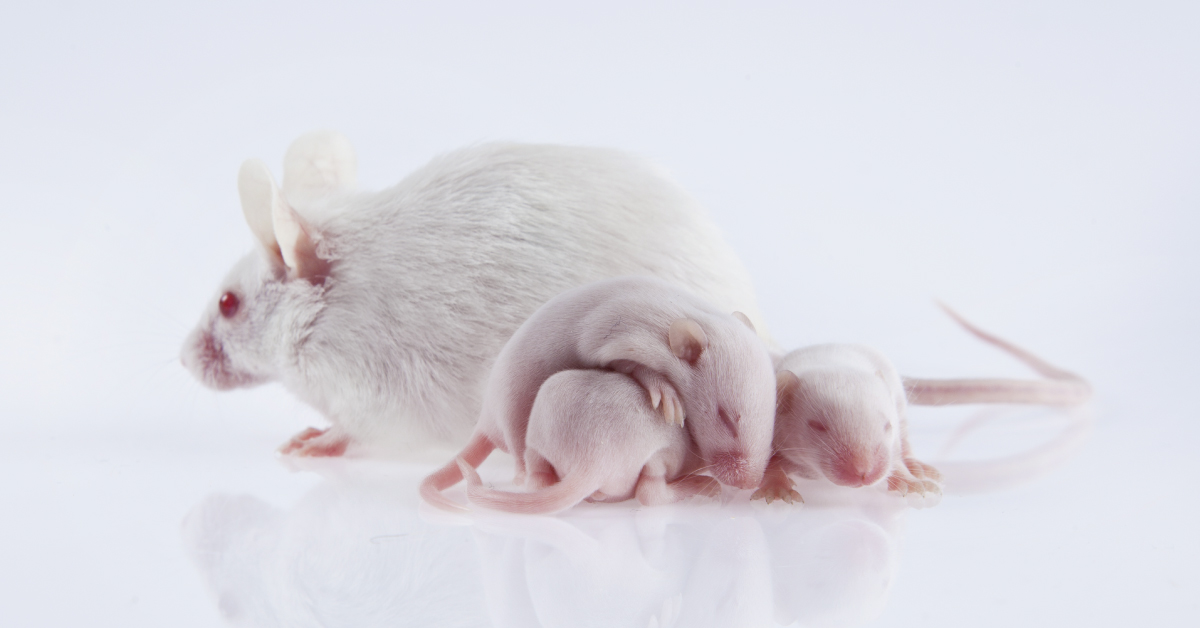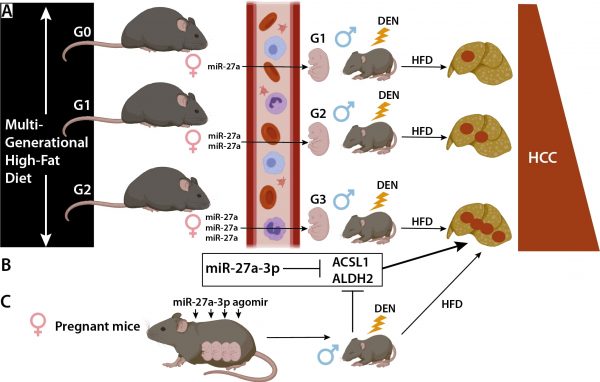Maternal obesity increases the chance of liver cancer in offspring for generations

Scientists have identified a microRNA in obese mouse mothers that may increase the odds of liver cancer in their offspring throughout multiple generations, report scientists in the Journal of Hepatology.
Amsterdam, June 25, 2020 – Scientists recognise the connection between maternal obesity and liver cancer in the offspring of obese mothers, however, the mechanism is not well understood. In a novel study, appearing in the Journal of Hepatology, published by Elsevier, investigators have identified a microRNA in obese mouse mothers that appears to pass on liver cancer susceptibility, increasing the odds of liver cancer developing in their offspring and throughout future generations.
One third of the world population is overweight or obese and this global obesity epidemic is threatening human health. Obesity confers a higher risk of developing metabolic diseases such as non-alcoholic fatty liver disease (NAFLD) and hepatocellular carcinoma (HCC). Up to 50 percent of recently diagnosed HCC in the United States is the result of hepatic metabolic disorders such as NAFLD.
“Maternal obesity, which directly affects the health of the offspring, plays a critical role in the obesity epidemic and metabolic diseases,” explained lead investigators Ling Zheng, PhD, College of Life Sciences, Wuhan University, Wuhan, China, and Kun Huang, PhD, Tongji School of Pharmacy, Tongji Medical College, Huazhong University of Science and Technology, Wuhan, China.
“Epidemiological studies show that obesity is an independent risk factor for liver cancer. Our study provides insights into the question of whether and how maternal obesity affects tumour incidence in offspring.”
Investigators administered diethylnitrosamine (DEN) to induce liver cancer in obese mice that had been fed a high-fat diet. RNA sequencing was performed to identify the genes and microRNAs that altered over generations. They found that injecting pregnant mice with the microRNA miR-27a-3p not only increased hepatic miR-27a-3p and reduced the expression of two genes, Acsl1 and Aldh2 in offspring (fetus, young, and adult stages), but also exacerbated HCC development in DEN-treated offspring.
High-fat diet-induced maternal obesity caused susceptibility of offspring to DEN-induced HCC, and the investigators established that this susceptibility was cumulative over generations. Furthermore, the odds for developing liver cancer increased intergenerationally. For example, the severity in the offspring of an obese mother and grandmother was higher than the offspring of an obese mother but normal-weight grandmother.
Caption: Multigenerational high-fat diet predisposes the offspring to chemical hepatocarcinogenesis. In vivo experiments showing that (A) HFD-fed female mice secrete miR-27a-3p and this increases with the generations (G0 to G2), leading to a higher HCC burden in G3 male mice compared to G1; (B) miR-27a-3p represses the expression of Acsl1 and Aldh2, responsible for this increased tumour burden; (C) Injection of miR-27a-3p agomir to pregnant female mice leads to the same phenotypic consequences in the offspring.
The investigators also analysed human samples of HCC.
“Our findings provide a mechanistic link between maternal obesity and the development of diseases in offspring, which will be helpful in exploring therapies and preventions for foetal- and developmental-originated diseases,” noted Prof. Huang.
“For pregnant mothers, the serum level of miR-27a-3p is critical for the offspring’s health and may be used in future as a diagnostic or predictive biomarker,” commented Prof. Zheng. “We would therefore like to call for a global effort on maternal multigenerational obesity in humans to better address this common problem we are facing.”
In an accompanying editorial, Sabine Colnot, PhD, Cordeliers Research Center, INSERM UMRS 1138, Paris, France, and André Lechel, PhD, Department of Internal Medicine I, University Hospital Ulm, Ulm, Germany, commented,
“This study opens a new avenue for cancer research at the crossroads of metabolism and epigenetics. It brings new information on how maternal stress could influence its progeny, with consequences for HCC development. The mode of inheritance is not a classical intergenerational one. It is multigenerational, as the susceptibility to HCC gradually increases over generations.”
Notes for editors
The article is “Multigenerational maternal obesity increases the incidence of HCC in offspring via miR-27a-3p,” by Yu Sun, Qing Wang, Yu Zhang, Mengyuan Geng, Yujuan Wei, Yanrui Liu, Shanshan Liu, Robert B. Petersen, Junqiu Yue, Kun Huang, and Ling Zheng (https://doi.org/10.1016/j.jhep.2020.03.050). The editorial is “Maternal obesity: A severe risk factor in hepatocarcinogenesis?” by Sabine Colnot and André Lechel (https://doi.org/10.1016/j.jhep.2020.06.014). They will appear in the Journal of Hepatology, volume 73, issue 3 (September 2020) published by Elsevier.
This work was supported by the National Key R&D Program of China (2018YFA0800700 and 2019YFA0802701), the Natural Science Foundation of China (91957114, 31871381, 31671195, 31971066 and 31871411).
Full text of this article is available to credentialed journalists upon request; contact Vicki Wetherell at +44 1865 843193 or hmsmedia@elsevier.com. Journalists wishing to interview the authors should contact Kun Huang at kunhuang@hust.edu.cn or Ling Zheng at lzheng@whu.edu.cn. André Lechel may be reached for comment at +49 731 500 44810 or andre.lechel@uni-ulm.de.
About the Journal of Hepatology
The Journal of Hepatology is the official journal of the European Association for the Study of the Liver (EASL). It publishes original papers, reviews, case reports, and letters to the Editor concerned with clinical and basic research in the field of hepatology.
About EASL
In the fifty plus years since EASL was founded, it has grown from a small organisation that played host to 70 participants at its first meeting, to becoming the leading international liver association. EASL attracts the foremost hepatology experts as members and has an impressive track record in promoting research in liver disease, supporting wider education, and promoting changes in European liver policy.
About Elsevier
Elsevier is a global information analytics business that helps scientists and clinicians to find new answers, reshape human knowledge, and tackle the most urgent human crises. For 140 years, we have partnered with the research world to curate and verify scientific knowledge. Today, we’re committed to bringing that rigour to a new generation of platforms. Elsevier provides digital solutions and tools in the areas of strategic research management, R&D performance, clinical decision support, and professional education; including ScienceDirect, Scopus, SciVal, ClinicalKey and Sherpath. Elsevier publishes over 2,500 digitised journals, including The Lancet and Cell, 39,000 e-book titles and many iconic reference works, including Gray’s Anatomy. Elsevier is part of RELX, a global provider of information-based analytics and decision tools for professional and business customers. www.elsevier.com


